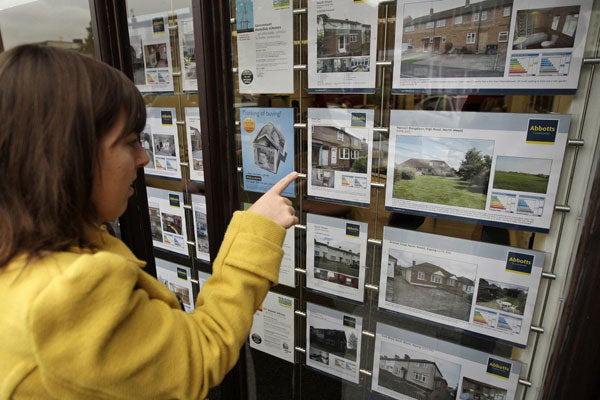UK and London house prices hit record high in pandemic ‘mini boom’
Stamp duty holiday helped boost prices across Britain over summer and autumn

Your support helps us to tell the story
From reproductive rights to climate change to Big Tech, The Independent is on the ground when the story is developing. Whether it's investigating the financials of Elon Musk's pro-Trump PAC or producing our latest documentary, 'The A Word', which shines a light on the American women fighting for reproductive rights, we know how important it is to parse out the facts from the messaging.
At such a critical moment in US history, we need reporters on the ground. Your donation allows us to keep sending journalists to speak to both sides of the story.
The Independent is trusted by Americans across the entire political spectrum. And unlike many other quality news outlets, we choose not to lock Americans out of our reporting and analysis with paywalls. We believe quality journalism should be available to everyone, paid for by those who can afford it.
Your support makes all the difference.The average UK house price reached a record peak of £245,000 in September – with no sign of the coronavirus pandemic putting the brakes on rising values, official figures show.
Property values were £11,000 higher on average in September than a year earlier, a 4.7 per cent rise, according to the Office for National Statistics (ONS).
All parts of the UK saw house prices go up during the latest month on record, while the typical London house price hit a record high of £496,000.
The ONS said the price increases may reflect a range of factors, including pent-up demand and changes to property taxes – which experts say helped create a “mini-boom” during summer and autumn.
A stamp duty holiday on property sales in England and Northern Ireland was introduced by Chancellor Rishi Sunak in July – set to run until the end of March 2021. Similar cuts were made on the property sales taxes that apply in Scotland and Wales.
Average prices increased over the year in England to £262,000 (4.9 per cent), in Scotland to £162,000 (4.3 per cent), in Wales to £171,000 (3.8 per cent) and in Northern Ireland to £143,000 (2.4 per cent).
Over the past four years, there has been a general slowdown in UK house price growth, driven mainly by a slowdown in the south and east of England.
But the ONS said the start of 2020 was already seeing a pick-up in annual growth in the housing market before the lockdown restrictions were put in place at the end of March 2020.
Mark Manning, managing director of Leeds-based estate agent Manning Stainton, said: “We usually see activity begin to slow slightly in September. But pent-up demand from the summer lockdown and the race to buy before the stamp duty holiday ends has resulted in record activity levels.”
Jeremy Leaf, a north London estate agent and a former residential chairman of the Royal Institution of Chartered Surveyors, said the report “underlines what we were seeing at the tail end of the aftermath of the first lockdown mini-boom”.
He added: “The stamp duty concession has proved to be a particularly important contributory factor and will continue to be so until prospects of meeting the spring deadline recede, unless of course the chancellor is minded to reconsider.”
Lucy Pendleton from estate agents James Pendleton said: "This was the moment the market really entered fifth gear this year, leaping from the doldrums into the jet stream with the full weight of lockdown and the stamp duty holiday behind it.”
Looking within England, the report said the south west was the English region with the highest annual house price growth, with average prices increasing by 6.4 per cent to £275,000 in the year to September.
The lowest annual growth was in the North East, where average prices increased by 3.3 per cent over the year to September. In contrast to the record house prices hit in London, the north east is the only English region yet to surpass its pre-economic downturn peak of July 2007.

Join our commenting forum
Join thought-provoking conversations, follow other Independent readers and see their replies
Comments